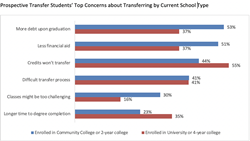
Students often enter a community college or other two-year school with the strong intention of eventually transferring to a four-year school…if these schools sit back and let students find them, they are missing key opportunities to engage them early.
BOSTON (PRWEB)
December 12, 2019
ACT® | NRCCUA®, an educational data science and research organization, announced today the publication of the 2019 Eduventures Transfer Student Research Report. The annual report explores the transfer process from the perspective of students who are currently enrolled at post-secondary institutions and are considering transferring to a different institution. In particular, it explores two distinct segments of the transfer market, those transferring from two-year institutions and those currently enrolled at four-year schools.
Increasing Competition for Transfer Students
Prospective transfer students are a little-understood population that is often treated as a homogeneous group by institutions—many of whom have come to rely on them to make enrollment targets. As community college enrollment has dropped by 20% and the transfer-in enrollment at private schools has risen 23% over the past decade, an increasing number of colleges are faced with more competition amid dwindling numbers of transfer applicants. This report outlines the primary motivations, priorities, and concerns among key transfer segments that could impact how they are best identified and cultivated, with implications for a successful transition to their new institutions and, ultimately, academic success.
Key Research Findings Include:
1. 62% of students at two-year schools solidify their transfer plans before enrolling at their original institution. About half of these students are highly sensitive to cost and are greatly concerned about receiving less financial aid (51%) and having to take on more debt as a result of their transfer (53%). These students also appear to have a greater need for support by others in the transfer process.
2. 74% of students at four-year schools start thinking about potential transfer schools while enrolled at their original enrollment institution, indicating less certainty about their transfer plans. Transfer motivations are driven by dissatisfaction with their current institution. While financial considerations are a top priority in the search process, four-year transfers worry much more about the credit transfer process (55%) and a delayed graduation timeline (35%). These students tend to be more self-sufficient in their search process.
3. Students at four-year institutions approach the transfer school search with a do-it-yourself mindset. 45% start their search on online search engines and 40% start on institutional websites, while those at two-year institutions seek help from trusted advisors (33%) and family and friends (39%).
“Students often enter a community college or other two-year school with the strong intention of eventually transferring to a four-year school,” commented Johanna Trovato, Eduventures Senior Analyst at ACT | NRCCUA, and author of this report. “If these schools sit back and let students find them, they are missing key opportunities to engage them early.” Trovato added, “National Student Clearinghouse data on non-enrolling student choices provides a comprehensive list of potential future transfers who may already be open to outreach from prospective transfer schools. This is the time to continue fostering relationships that institutions have already started to build when these students were still in high school.”
About ACT | NRCCUA
Now part of ACT, The National Research Center for College and University Admissions™ is an educational data science and research organization serving over 1,900 member institutions comprised of public and private colleges and universities across the nation. Since 1972, NRCCUA has been a leading provider of data, technology, and programs serving students, high school educators, colleges and universities from its offices in Lee’s Summit, MO, Boston, MA, New York, NY, and Austin, TX. These solutions represent the link between students making important life decisions and those providing the resources and information they need to succeed in their post-secondary educations and careers. With the launch of Encoura™ Data Lab, the company now combines data science, advanced analytics, Eduventures research, predictive modeling and omnichannel enrollment services in one platform to enable institutions to make real-time strategic and operational decisions to meet their unique enrollment goals and create the highest probability of student success. For more information, visit https://encoura.org.
Members of the media who would like to speak to the author of this report or obtain a copy of the report can contact Ellen Slaby at eslaby@eduventures.com.
Share article on social media or email:

